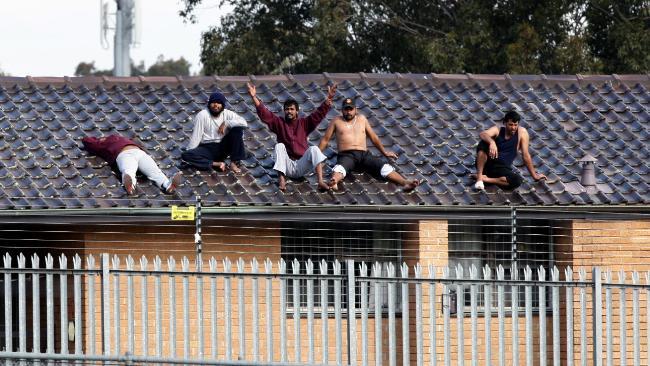Detention centre staff condemned by coroner over deaths of Villawood detainees
A DAMNING coroner's report has accused detention centre authorities of failing to properly care for three asylum-seekers who later took their own lives.

A NSW coroner has slammed the immigration department and two private contractors for failing in their duty of care to three asylum-seekers who took their own lives over a three-month period in 2010.
In an inquest into the deaths of the three men at Sydney's Villawood Immigration Detention Centre, Magistrate Mary Jerram found the Department of Immigration and Citizenship, Serco Australia and International Health and Medical Services had failed to recognise and properly care for the three detainees' deteriorating mental states.
In all three deaths she described the actions of some staff as “careless, ignorant or both”, and found that communications between the different agencies were “sadly lacking”.
Ms Jerram found staff were poorly trained and key protocols were not followed, describing the situation immediately prior to one death as “chaotic”, and the actions of one staff member in relation to another as “deplorable”.
The three men, Josefa Rauluni, Ahmed Al-Akabi and David Saunders, all took their own lives at the Villawood detention centre in Sydney's west between September and December 2010, Ms Jerram found.
Mr Rauluni, a Fijian citizen, plunged to his death from a balcony after his application for asylum was refused and multiple attempts at appeal had failed.
An IHMS officer had identified Mr Rauluni as being at “no immediate risk” of self harm, just days before he told a relative and fellow inmate he would “find somewhere to jump from” if his final appeal failed, and written to the minister stating if he was returned it would be his “dead body”.
Ms Jerram found scenes immediately prior to Mr Rauluni's death were “chaotic”, with people shouting at Mr Rauluni, who was “becoming increasingly upset, stepping up onto the balcony rail and then off again”.
A short time later he dived head first onto the concrete and died.
At the inquest, psychiatrist Michael Diamond was “highly critical of the management of the entire situation”, describing the lack of coordination between Serco and DIAC officials as a “standout”, and deploring the “absence of basic awareness, training and capability to handle a situation of this nature”, according to Ms Jerram's report.
Chief Inspector Peter Abel, the most senior negotiator in the NSW Police force, also criticised the way the incident was handled, saying there was “no evidence of any clear command structure, and nor was there any single negotiator”.
Mr Al-Akabi, an Iraqi, arrived in Australia by boat and was initially assessed as not being at any risk of suicide or mental illness, although later ticked `yes' to a written question about whether he felt life was not worth living.
In her report, Ms Jerram found: “It is clear that both (Mr Al-Akabi's) mental and physical health deteriorated gradually over the period of his detention, and that though DIAC and IHMS recorded that, very little was done to assist him.”
Procedures for monitoring a detainee's risk of self-harm were “not followed”, Ms Jerram found.
Mr Al-Akabi was found hanging from a pipe in a bathroom.
In expert testimony, consultant psychiatrist Suresh Sundram told the inquiry Mr Al-Akabi had been misdiagnosed with an “adjustment disorder” rather than major depression.
David Saunders, a British citizen, arrived in Australia on a tourist visa. He was arrested the day after his visa expired, after police became aware he was under investigation, but not charged, by UK police for possession and distribution of child pornography and for a child sex offence that was later withdrawn.
In her report, Ms Jerram found information about Mr Saunders' previous threats of and attempts at suicide was not properly communicated among the various agencies handling his case, and he was therefore assessed as “nil risk” of self harm.
He was eventually assessed and placed on “officers' watch” after an email from his mother detailing his past suicidal threats was circulated, but Serco officers ordered to carry out the watch were not made aware he was a suicide risk, Ms Jerram found.
The officer required to check on Mr Saunders every 60 minutes did not do so, and he was found by another detainee hanging in a running shower with a suicide note in his pocket.
In the conclusions of her 17-page report, Ms Jerram notes that immigration detainees are at “much greater risk of suicide than the general community, and therefore that the agencies responsible owe them a greater duty of care”.
“It has to be said that none of the three authorities escape criticism for the manner in which that duty was fulfilled,” Ms Jerram writes.
“It cannot be said that appropriate screenings or protocols were in place, or at least carried out, to minimise the risk (of self harm) or treat appropriately.
“The lack of consistency arising from constant changing of case managers and health professionals was exacerbated by a failure to record or share important information. Policies and protocols were often ignored.
Ms Jerram concludes that Serco staff were “completely unprepared and untrained” to deal with Mr Rauluni's traumatised outburst on a balcony, and that Mr Al-Akabi was “probably misdiagnosed and medicated”, and that his records were both “lacking in detail and apparently not consulted”.
“In all three deaths, some of the actions of some staff were careless, ignorant or both, and communications were sadly lacking,” Ms Jerram found.
She described “startling examples” of mismanagement on the part of DIAC, Serco and IHMS, but found no-one acted in bad faith deliberately.
Ms Jerram detailed three pages of recommendations that will be sent to federal Immigration Minister Chris Bowen for consideration.
* Readers seeking support and information about suicide prevention can contact Lifeline on 13 11 14 or SANE Helpline on 1800 18 SANE (7263).



